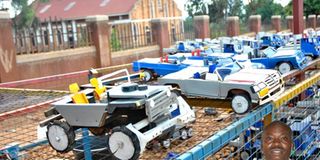Kyambadde crafts millions out of toy cars

Toy cars on display on Kampala-Jinja highway at Namanve, Mukono District. Inset below is Joseph Kyambadde. Photos by Racheal Ajwang
What you need to know:
Innovation. For some, crafting toy cars may not appear a worthwhile venture to invest their money in. But to Joseph Kyambadde, making toy cars has become a gold mine, writes Roland D. Nasasira.
As millions of people around the world were ushering in the new year on January 1, 2015 Joseph Kyambadde, in his late 40s, was opening Kiwukaki Toy Car Manufacturers to the world - an investment he named after his grandfather. “In the late 2014, I met a young man who was hawking manually-made toy cars. When we had a chat and he shared with me how he crafted them, I realised that we could join hands and improve the quality of these toy cars,” Kyambadde recalls.
His then new business partner Stephen Kalyowa also welcomed the idea of making other versions of toy cars as opposed to producing only those that looked like tractors. Following a business agreement between Kyambadde and Kalyowa, Kyambadde provided one of his plots in Kigunga, Mukono District as the base from where the toy cars would be made.
“I started with Shs200,000 as capital. With this money, I bought pieces of wood, metal and old car tyres that are used for making the toy cars,” Kyambadde explains. Currently, the two work at the same production centre but have different selling points.
After making the cars, Kyambadde would transport them to Seeta where he would sell them from the veranda of his mini supermarket.
With time, the veranda became too small and he decided to weld a cage by the roadside opposite Jomayi Construction sales point along Jinja Road in Namanve.
The difference between the toy cars that Kyambadde makes and those sold in some supermarkets is that his are made out of wood and metal and are more durable and strong compared to the plastic ones. “A child can sit on the toy car and it doesn’t breaks,” he says.
Job creation
Kyambadde employs about 15 workers who engage in different production stages. For instance there is a trained person who makes the trailer head and a different one responsible for developing the trailer frame.
There is also a different employee who cuts plastics to make toy car mudguards and a different one who joins the tractor or trailer head to the rear part to make a complete trailer toy car.
There are also workers responsible for the final painting of the car, those for cutting tyres into desirable shapes, as well as those who cut timber and metals into the required shapes and size depending on the toy car to be made.
At Kiwukaki Toy car bond in Seeta, the costs range from Shs15,000 to Shs35,000. The toy tractors cost Shs15,000 while the convertible ones cost between Shs20,000 and Shs45,000 whereas the trailers cost Shs35,000.
“I usually have high demand and sales for these toy cars during school holidays than when the children are in school,” he says.
Challenges
Just like any other business that faces challenges, Kyambadde says employee turnover cripples his business. “I invest time and teach employees how to make these toy cars but after they have learnt, some leave and never come back,” he says.
With only one year and two months down the road and Shs2 million that Kyambadde makes as profit, he has bought a plot of land and is in the final stages of opening up a bar business.
Advice to youth
Kyambadde urges the youth not to underestimate any job if they are to fight unemployment. “I receive and train youth on making these toy cars. After training, I sometimes employ them and they are given lunch and accommodation as they improve on their technical skills,” Kyambadde concludes.
He says it is how small and humbly one begins that determines who they eventually become when they work hard on what they do.




